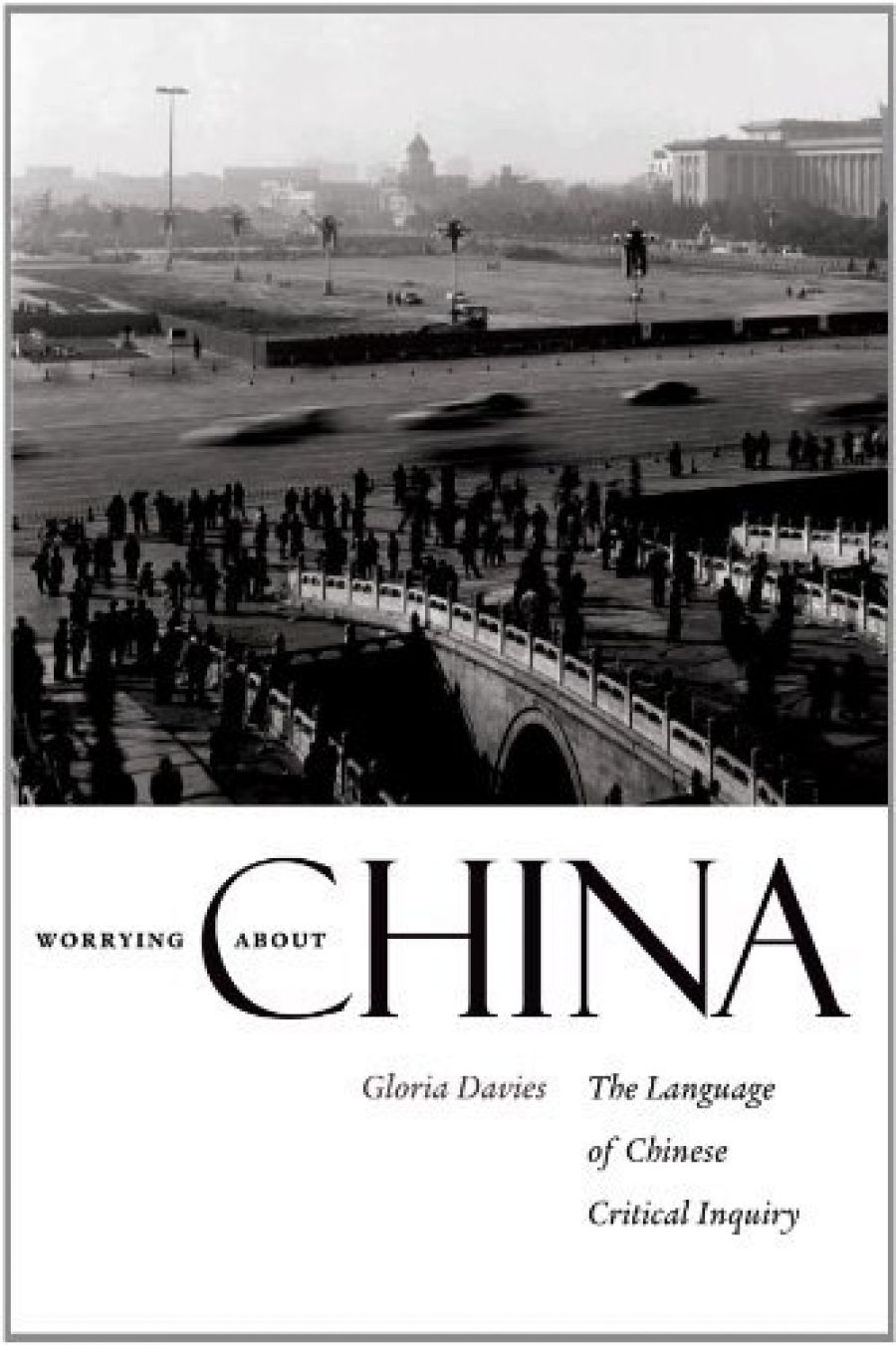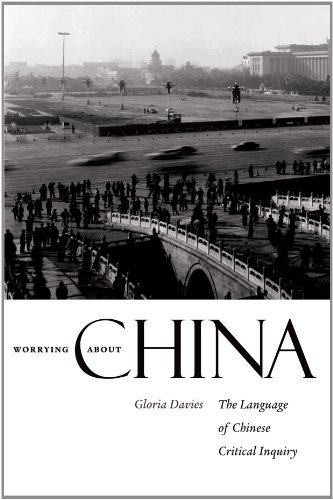
- Free Article: No
- Contents Category: Language
- Review Article: Yes
- Article Title: Surrounded by fog
- Online Only: No
- Custom Highlight Text:
Gloria Davies quotes William Blake in the acknowledgments to her book: ‘true friendship is argument.’ When choosing that quote, I wonder if she had the Chinese concept of zhengyou in mind. That is the word Kevin Rudd chose for friendship when he spoke to the students at Peking University in April this year. Zhengyou is not just about friendship, for which there is another Chinese word (youyi); it defines a true friend as one who dares to disagree.
- Book 1 Title: Worrying About China
- Book 1 Subtitle: The language of Chinese critical inquiry
- Book 1 Biblio: Harvard University Press, $39.95 hb, 313 pp
- Book 1 Cover Small (400 x 600):

- Book 1 Cover (800 x 1200):

Worrying about China is about Chinese intellectuals worrying about China. It explores the complexity and sophistication of their thinking. Davies reveals that these thinkers regard worrying about China as part of their patriotic duty; their efforts will help the country reach perfection. Despite this loyal sentiment, thinking for many of those discussed in this book is still a courageous activity, for there is vigilance against dangerous ideas. Intellectuals must frame their arguments in ways that will not arouse the party’s ire. The use of language is a leitmotif of the book.
This could strike the reader as an arcane discussion among Chinese linguists about the place of classical Chinese in the modern vernacular, and about semiotics. However, as Rudd showed us in his Peking University speech, finding the right Chinese word can matter.
Equally important is the intellectual effort required to distil ideas and fashion them into policy settings. Having read Davies, I would now hazard a guess that this type of mental and linguistic gymnastics is what spurred Rudd to continue his Chinese studies up to the present, and is what lies behind his vision of engagement with China that combines President Hu Jintao’s phrase ‘harmonious society’ with Bob Zoellick’s (much clunkier) notion of a ‘responsible global stake-holder’. (Zoellick, now the head of the World Bank, was the US deputy secretary of state when he aired the idea.)
Language is a vital tool in this ideas game. Most of the Chinese thinkers cited in this book prefer what Davies calls ‘certitude in the use of language’. (I hope this might translate into what we commonly call ‘plain English’.) This poses a problem when they delve into the strand of Western thinking that Davies has examined, that of the structuralists and postmodernists, who are all about ‘linguistic contingency’. Davies takes these ‘deconstructionists’ seriously. Her book is littered with references, in particular to Jacques Derrida, described, rightly, by his detractors as an obscurantist. The result is analysis of important matters, such as the influence of Samuel P. Huntington’s thesis about a ‘clash of civilisations’, presented as follows:
Since Huntington’s phrase belongs to the same genre of abstract truth-formulations that have found much favour in Sinophone intellectual discourse, it is not surprising that that phrase [clash of civilisations] has now acquired a would-be axiomatic status in that discourse ... Its popularity [in English speaking societies] attests to the captivity of our imagination to the still powerful assumption that language represents ‘what is really happening out there’ as opposed to the self-reflexive notion that language constructs powerful but multiple narratives of ‘what is really happening out there’ through its effect of figuration.
While I am critical of this prose, I am also sympathetic to Davies’ examination of how language and the culture inherent in a particular language can skew translation and interpretation. We need to be much more sensitive to linguistic and cultural difference, but I fear the post-modernism that has influenced this book takes us too far into an absurdist Rumsfeldian world of not knowing even what we do know. When it comes to China, we cannot afford such abstractions.
The twist in all this is that the Chinese thinkers whom Davies has studied have trawled through this foreign thought in ‘a quest for certainty, a quest envisaged in terms of the acquisition of better, more rational, and theoretically refined knowledge’. If that means an evidence-based approach, it could spell trouble in a country still ruled by the ideology of the party.
Davies discusses the constraints the system imposes on Chinese intellectual life: state censorship and reliance on party sanction in particular. Chinese academics wanting to retain their jobs have to think hard about what they say in print or cyberspace.
Davies also teases out the dilemmas long present in Chinese thinking about China’s place in the world. The questions being asked are whether China should catch up with the West, join it or hark back to its own Confucian tradition, or forge its own truths. It is instructive to learn about these dilemmas, for they can tell us much about what influences China’s engagement in the international arena. We think of China as huge and powerful, yet still it carries a chip on its shoulder. For example, Davies points out that this ambivalence about the reliance on Western ideas is rendered even more acute by the fact that Chinese scholars are conscious of the absence of any substantive reliance on Chinese ideas in the work of Western academics.
Such analysis can give pointers to how we deal with China and might even reveal the secret behind Rudd’s success in Beijing. His criticisms of human rights were not presented in the rhetoric of the Western liberal tradition but were cushioned in talk about Chinese concepts of friendship and state-building.
The thinkers in Davies’ book believe it is their moral burden to worry about China. They are taking foreign ideas to strive for national and cultural perfection. According to Davies, their readers also believe that the publication of ideas should be first and foremost a selfless labour in the interest of the greater good. This is an idea that holds considerable appeal, but to succeed in such an endeavour intellectuals need to communicate to people beyond their own disciplines.
Chapter Three of this book is called ‘Divided over China’. It is a discussion of the arguments between the New Left and liberals about the nature of Chinese reform; the implications of rampant commercialism, including some nostalgia for Maoist socialism; official corruption and the lack of individual freedom: in other words, important questions for all those worrying about China. Unfortunately, as the prominent philosopher Li Zehou has observed, this debate got bogged down in a frenzy of quotes and long essays. Davies quotes Li Zehou as saying that reading these writings was akin to ‘being surrounded by fog’ and being rendered ‘dizzy and comatose’. I regret that, for most lay readers, much of Worrying About China could have the same effect.
Xi Jilin, a Shanghai-based historian discussed in the book, has observed that intellectual inquiry in China is crucial for promoting the political freedom yet to be achieved on the mainland. Davies draws on these comments to ‘remind Western academics and intellectuals that the public defence of ethical concerns is crucial, particularly in our media-saturated times’. Indeed. For that reason, I would urge her to think about how she can draw further on her impressive scholarship to contribute to contemporary deliberations about China in the Pacific Century in a way that leaves the language of critical inquiry behind. Instead, she might recall her own quotation of Confucius: ‘In the matter of language, a gentleman leaves nothing to chance.’


Comments powered by CComment